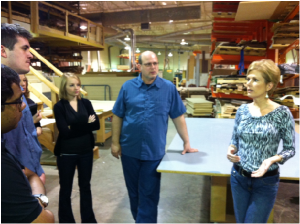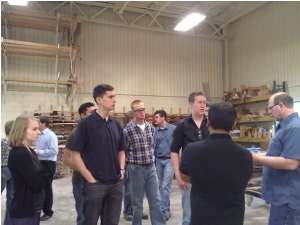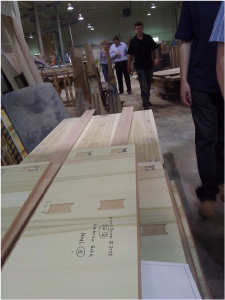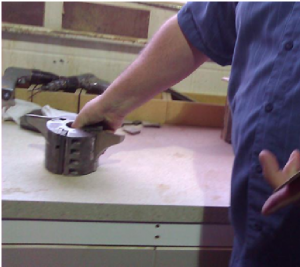Tuesday morning, we visited the Indianapolis Woodworking, Inc. (IWI) where we toured their fabrication facility. We had the opportunity to meet Kevin Owen, the Plant Manager, and Cynthia Hauth, the President and founder of IWI. Cynthia grew up surrounded by millwork; her father had immigrated from Europe and started his own fabrication company, where Cynthia worked part-time while growing up. Millwork, an $11B industry, the same one that gives a building that ‘finished’ look, is something that most of us will encounter in our careers.

Cynthia, President, and Kevin, Plant Manager, address the group

The group listening to Kevin Owen, Plant Manager, explaining the painting process.
A typical work week for the 26 tradesmen is 10 hours a day five days a week with optional Saturday; a slow week is 8 hours a week with no Saturday work. The company focuses on, but does not primarily perform, high-end residential projects, like the Trump Tower and Lake Shore Drive projects in Chicago. One of their current projects that is not residential is the Reva and David Logan Center for the Arts for the University of Chicago, which is contracted out to Turner Construction Company. In addition to performing everything from veneering to finishing, IWI provides installation services. Once a project is sent to be bid based on the design, there is a minimum of 3 bidders for each package, the general contractor and architect give recommendations for subcontractors to submit estimates. Depending on the construction stage and material availability at the time, the millworking shop works anywhere from 2-3 or 9-10 projects.

The group walking on the facility tour with Cynthia, the company’s President.
Indianapolis Woodworking, Inc. is FSC (LEED Forest Stewardship Council) certified, which ensures that their material comes from a sustainable managed forest. It costs the company $10,000 a year in order to maintain their FSC certification. The production shop receives regular inspections from OSHA for safety and IDEM (Indiana Department of Environmental Management) for air control. Throughout the tour we saw that safety was a high priority, although very different from what most of us were used to seeing in the field. The amount of protection that is necessary for the mill is more than adequate for the working environment.

Kevin, Plant Manager, shows the group the profile knives.
IWI is also a registered WBE company. We had the opportunity to talk to Cynthia about this aspect of the company and the difficulties behind it. As someone who grew up in the industry, her response was simple and straight to the point: “Our clients come to us for our quality; they look at the WBE as an added bonus to our work.” Touring the facility and talking with Cynthia, it was apparent that she was very passionate about her work.
The current situation of the industry allows the general contractor to have more leverage over vendors, which leads to shorter lead time and more paperwork. It has been a great learning experience and insight for us, as future construction managers, to understand the vendor perspective and observe the craftsmanship.
